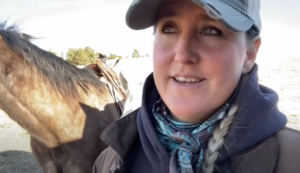From Laura Hicks
Laura Hicks has been a rancher since the day she was born. Her father was a cattle rancher and a veterinarian. Laura has ranched with her husband, Mike, and their 2 sons, Dustin and Brady in western South Dakota all of her adult life. They raise cattle and sheep. Laura has been a tough sheepdog competitor over the years as well as a successful breeder of Border Collie sheepdogs. Laura says “watching a good dog work livestock is truly poetry in motion.”

Laura has this to say
Confidence. It is such an all-encompassing word. A dog needs it to work stock well. It is also something that is developed and built upon with time and experience. Unfortunately, it’s also a fragile element. Bad experiences can shake a dog’s confidence just as the good experiences build upon it. Once you have established a solid foundation of mutual trust with a dog, it seems to be a bit harder to completely destroy the dog’s confidence. But that can take the occasional “shot” to it and this is where the rebuilding comes into play.
I work cattle mostly but have recently gotten into the sheep business. I find it isn’t so much the stock as the experiences the dog has with the stock that play a part in how confident they are when working. Since my dogs have all worked cattle from a young age, they tend to read and understand them better than they do with sheep. Along with working cattle though come a few hard knocks. Those include physical knocks as well as mental ones.
I love to watch the silent communication going on between dog and stock. The cattle know very quickly if the dog is serious. Unfortunately, that also means they can tell when the dog is feeling a bit scared. If the cow challenges and the dog weakens, this will play hard on the dog’s mental state. If the cow roughs the dog up in the process, well, double whammy! Quite often the dog doesn’t weaken and still gets a bit of physical punishment. An experienced dog takes this in stride and it rarely shakes their confidence. Often though, the young, inexperienced dog will be a bit shaken.
It’s important to set a young dog up in situations he can win and to help him when he needs it to build is confidence.
This is where our job as handlers is very important. When a young and/or inexperienced dog takes a shot or is in trouble moving stock, get in there and help! I’m assuming you have done your best to raise this pup up into a confident young adult by doing your best to keep it from getting hurt while growing up. So why would anyone stand around and watch a young dog get tromped by stock?
Yes, a dog that works cattle (or any stock, really) is going to get hurt from time to time. That is why most of us like dogs with a lot of heart and drive so they will ‘keep coming back for more.’ But, I for one, like a dog with quite a bit of brainpower. Along with this comes a dog that is smart enough to realize that “If I keep going in there with those rank cattle and keep getting hurt while that woman stands over there and hollers directions but does nothing herself, it doesn’t make much sense for me to keep going back in there.”
So let’s say your young dog takes a pretty good beating, either mentally or physically, what can we do to help rebuild their confidence? First of all, if possible, put them back on easier stock right away and let them be in a winning situation again. Unfortunately, that isn’t always immediately possible. Sometimes you’re out in the middle of a pasture gathering cattle and you have to get the job done. Since the dog and I are (hopefully) trying to accomplish the same goal, I’m going to be over there to help. Mainly out of necessity to get the job done. I am NOT going to get angry with the dog though. This would only be counter-productive to our goal of having a confident dog in the long run.
When the young dog sees me (the big cheese) ride over and help him put that cow back in the bunch it is essentially teaching him that he is never alone in these battles. That it is a winning situation. I’m sure I’ve actually seen a few of my dogs making funny faces at cows after we’ve gotten them back to the bunch. Probably thinking “Ha, you thought you were tough huh, not quite as tough as that ‘six-legged creature now are you!”
Each of these “battles” that the dog wins either alone or with assistance from me or another dog is another step towards that solid foundation of the confidence we are trying to achieve.
I’m afraid some people expect their young dogs to come “out of the box” working with the same power and confidence as the old pros. Unfortunately, that isn’t often the case. Those “old pros” got that way through experience. The only way to get that kind of experience with your dogs is a lot of “wet collars.”
Some dogs, even with all the experience in the world, are never going to be strong dogs. But we need to learn to differentiate between weakness in a dog and just lack of experience. If they have an immense amount of heart, natural ability, and a handler willing to help them win the battles, they stand a good chance of becoming one of the “old pros.”
Here’s wishing you a strong enough dog to get the job done and enough sense to know when to help!